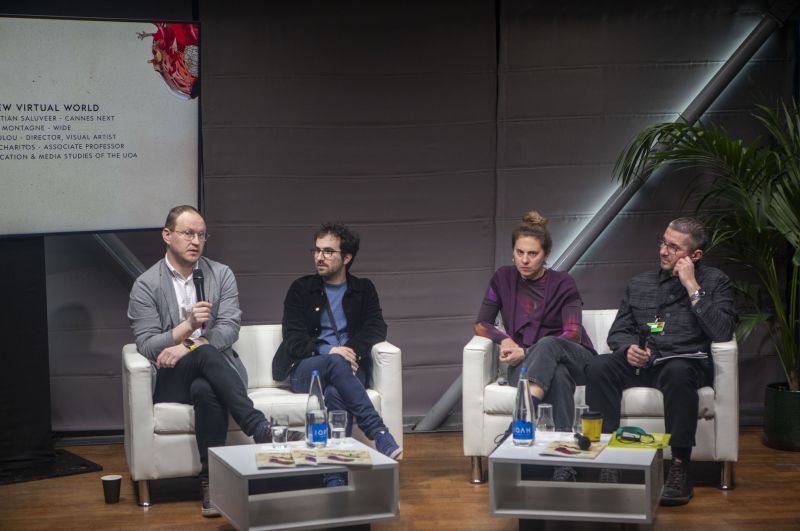Within the framework of the Agora Talks of the 25th Thessaloniki Documentary Festival, the discussion "A brave new virtual world" was hosted at MOMus - Thessaloniki Museum of Photography, featuring documentary professionals that shared practical tips and experiences with the Festival's accredited guests. The speakers were Sten-Kristian Saluveer, head of Cannes Next, Maxime Montagne, sales agent at Wide, Yolanda Markopoulou, director and visual artist and the discussion was moderated by Dimitris Charitos, associate professor of the Department of Communication and Media Studies at the National and Kapodistrian University of Athens.
Dimitris Charitos kicked off the discussion. "A wondrous new universe is being formed and we are its virtual inhabitants. In this Agora Talk, VR, AR, XR, and Immersive filmmakers meet with professionals from the documentary industry, such as producers, representatives of foreign festivals and sales companies, as well as scholars, to discuss the inexhaustible versatility of this awesome cinema making medium and the limitless opportunities which are bound to arise from the rapid technological advancement."
Sten-Kristian Saluveer, 2017 Oscar nominee, proceeded to introduce himself to the audience. "Thank you for the invitation and the wonderful films I'm seeing. I've been involved in innovation strategies for the last 25 years, based in Estonia and Japan. I'm a producer of audiovisual media and a content and technology entrepreneur, founder of Storytek and head of NEXT at the Cannes Film Festival's Marché Du Film. I am also a partner at Exit Academy - a personalized mentoring and advisory program that helps passionate startup founders master the skills to leverage their companies' potential for successful exits."
Next, Maxime Montagne took the floor, thanking the festival. "I'm happy to talk about VR. For the last six years I've been working as a sales agent for Wide. We deal with traditional cinema, but since 2016 we have been working with filmmakers and producers who are interested in VR and want to find distribution companies for their work."
Immediately after, Yolanda Markopoulou addressed the audience: "I'm excited to be here as a newcomer to the field. I come mainly from the world of theater and performance." Ms Markopoulou presented the video of White Dwarf, an interactive virtual reality installation that presents a piece of the history of the first atomic bomb in terms of virtual reality in an immersive experience. White Dwarf had inaugurated the All Around Cinema venue in the Port of Thessaloniki, as part of the newly established Immersive-All Around Cinema section of the 63rd Thessaloniki International Film Festival.”
Mr. Charitos then introduced himself to the audience. "I am a professor at the Department of Communication and Media Studies at the National and Kapodistrian University of Athens and also the head of the newly established Department of Digital Arts and Cinema, where we will have our first graduates this year. I have studied Architecture and worked with interactive environments."
In response to Dimitris Charitos’ question on how to integrate young filmmakers into this VR market, Sten-Kristian Saluveer replied the following: "This is the best time for VR. I mean, in the last 18 months there's been an explosion in technology and in this particular field. We have tools both for image and sound purposes, now available to everyone. This technology is the link between the cinema world and the immersive world. With the tools available anyone with the skills can create VR films from home. Platforms are constantly increasing their audiences, so all we need to do is train filmmakers to make better stories. Many programs have been created exclusively for filmmakers to transition into the VR world. There are many opportunities and possibilities out there."
Speaking from experience, Maxime Montagne pointed out: "We have been promoting and selling more VR material in recent years. More and more directors prefer it. It's a trend that is constantly developing. There is a revolution in this field as now filmmakers have become familiar with VR. However, since it differs from traditional cinema, a balance needs to be found with storytelling and interactivity.”
According to Yolanda Markopoulou: "it's amazing how life brings opportunities in front of you. I was only interested in movies and hadn't thought about VR. When we created a theatrical production for the Planetarium, we decided to turn it into VR. We hadn't attempted it before. What we did was to change the story. We have to experiment and look for new ways of storytelling. To educate ourselves and interact with each other and share our experiences. The technology is there so let's take advantage of it in order to attract a larger audience."
What kind of storytelling can we create with VR? Montagne stated: "VR combines cinema, theater music, dance and it’s a little bit of everything. It depends on each project what it will use and that's why every experience is different. The fact that it incorporates so many things creates so many artistic possibilities. Filmmakers come from many backgrounds and that's the most interesting thing about VR, that it gives you endless opportunities to create”. “The secret is that you have many tools to use. The audience is not yet trained for these types of projects. However, they are very excited when they come to see something different," noted Ms. Markopoulou.
As Mr Charitos pointed out: "Essentially, filmmakers have to start from scratch in order to make VR films. These are more free and less structured works, which do not limit emotion. They allow the audience to go wherever they want without the creator guiding them on a specific path." According to Maxime Montagne, the venues for promoting VR films are not only at events and festivals but also in galleries and museums. As well as dedicated online stores for VR. “There are many possibilities and very strong players who want to invest in VR,” he said. French journalist David Cage was among the audience and added: "There is a lot of creativity in VR and it is very positive that festivals are involved with virtual reality."















